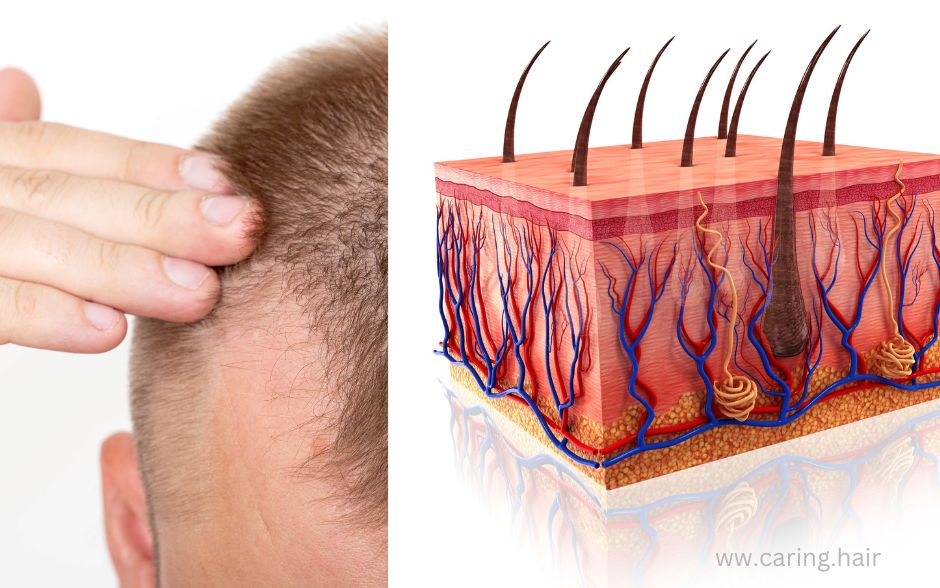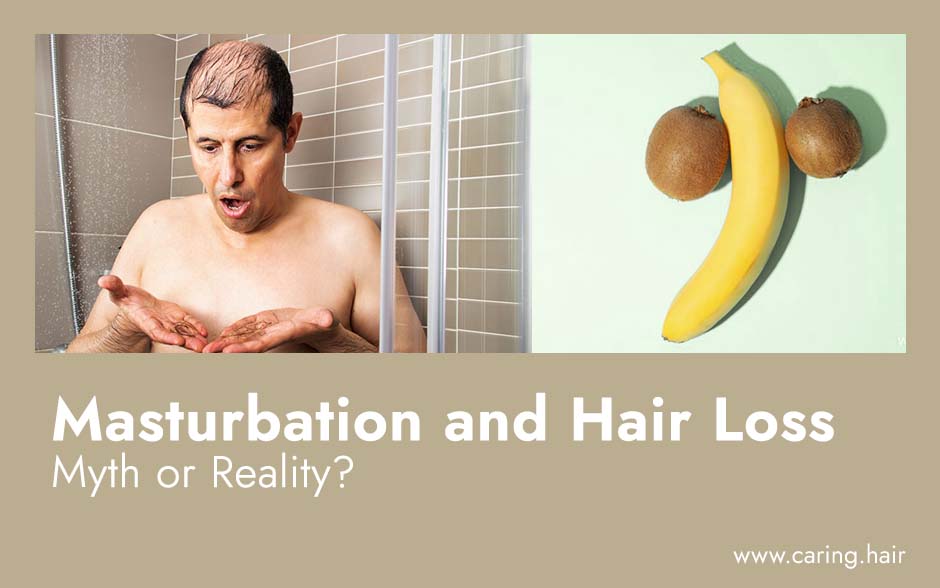Masturbation is a topic that has been surrounded by myths and misconceptions for a long time. One such myth is that excessive masturbation can lead to hair loss. This idea has gained a lot of traction in recent years, with many people believing it to be true. However, is there any scientific evidence to support this claim, or is it just another baseless myth? In this article, we will explore the relationship between masturbation and hair loss, and try to separate fact from fiction.
What is masturbation?

Masturbation is the act of sexually stimulating oneself by touching one’s own genitals. It is a common sexual practice among both men and women, and is usually done for pleasure or to relieve sexual tension.
The link between masturbation and hair loss
The idea that masturbation causes hair loss has been around for a long time. It is believed that excessive masturbation can lead to an increase in the levels of a hormone called DHT (dihydrotestosterone), which is known to cause hair loss. DHT is a byproduct of testosterone, and it is responsible for the development of male characteristics, such as facial hair and a deep voice.

According to this theory, when a man masturbates excessively, it causes a spike in his testosterone levels, which in turn leads to an increase in DHT levels. This excess DHT then attacks the hair follicles, causing them to shrink and eventually stop producing hair.
Is there any truth to this theory?
While the theory linking masturbation and hair loss may sound plausible, there is no scientific evidence to support it. In fact, several studies have debunked this myth and shown that there is no link between masturbation and hair loss.
One study published in the Journal of Sexual Medicine found that there was no significant difference in the levels of DHT between men who masturbated frequently and those who did not. Another study published in the Indian Journal of Dermatology also found no association between masturbation and hair loss.
Healthline article on natural hair growth cycle
According to a Healthline article, hair growth occurs in cycles, with each hair follicle going through three stages: anagen, catagen, and telogen. During the anagen phase, hair grows actively. The catagen phase is a transitional phase when hair growth stops, and the hair follicle begins to shrink. The telogen phase is the resting phase, during which the hair falls out and the cycle begins anew. Masturbation does not affect the natural hair growth cycle, and hair loss is not caused by frequent masturbation.
RealSelf Q&A on the role of DHT in hair loss
A RealSelf Q&A with dermatologist Dr. Jeffrey Rapaport also refutes the claim that masturbation causes hair loss. Dr. Rapaport explains that DHT is primarily responsible for male pattern baldness and that levels of DHT are not affected by masturbation. He also notes that hair loss can be caused by a variety of factors, including genetics, hormonal imbalances, medical conditions, and medications.
A top hair transplant surgeon Dr Umear Ahmad has warned that ‘too much’ masturbation could cause hair loss, but before you panic too much he did say that it would only really happen if you were going at it ‘non-stop’.
What People say on social media:






Other Factors that Influence Hair Loss
Lifestyle and environmental factors
In addition to genetics, hormonal imbalances, and medical conditions, hair loss can also be influenced by lifestyle and environmental factors.
- Diet and nutrition
A healthy diet rich in vitamins and minerals, such as iron, zinc, and biotin, can help promote healthy hair growth. On the other hand, a poor diet lacking in essential nutrients can contribute to hair loss.
- Stress and sleep
Stress and lack of sleep can also affect hair growth and lead to hair loss. High levels of stress can cause hair follicles to enter the telogen phase prematurely, leading to excessive shedding.
- Hair care practices
Certain hair care practices, such as excessive heat styling, chemical treatments, and tight hairstyles, can damage hair and lead to hair loss.
B. Psychological and emotional factors
Psychological and emotional factors, such as anxiety, depression, and body image issues, can also contribute to hair loss. Stressful life events, such as divorce, job loss, or the death of a loved one, can trigger hair loss in some people.
Hair Loss Causes
A. Genetics and hormonal imbalances
Hair loss can be caused by a variety of factors, including genetics and hormonal imbalances. In men, male pattern baldness is the most common form of hair loss and is largely determined by genetics. Male pattern baldness is caused by the hormone DHT, which can shrink hair follicles and make them produce thinner and shorter hair strands.
- Role of DHT in male pattern baldness
DHT is a derivative of testosterone and is produced by the enzyme 5-alpha-reductase. DHT binds to androgen receptors in hair follicles, leading to their miniaturization and eventual death. While DHT is primarily responsible for hair loss in men, it is important to note that not all men with high levels of DHT experience hair loss.
- Hormonal changes during puberty, pregnancy, and menopause
In addition to genetics, hormonal changes can also contribute to hair loss. Hormonal changes during puberty, pregnancy, and menopause can all affect hair growth and lead to temporary or permanent hair loss.
B. Medical conditions and medications that can cause hair loss
Hair loss can also be caused by medical conditions and medications. Some examples include:
Alopecia areata is an autoimmune disorder that causes hair loss in patches on the scalp and other areas of the body.
- Thyroid disorders
Thyroid disorders, such as hypothyroidism and hyperthyroidism, can affect hair growth and lead to hair loss.
- Chemotherapy and other drugs
Chemotherapy and other drugs used to treat cancer, arthritis, depression, and other conditions can also cause hair loss as a side effect.
Question about Masturbation and Hair fall
Can masturbation cause baldness?
No, there is no scientific evidence to support this claim. However, excessive masturbation can cause physical and psychological discomfort, such as soreness, fatigue, and anxiety.
Is there any treatment for hair loss?
Yes, there are several treatment options available for hair loss, such as medications, hair transplant surgery, and laser therapy. The treatment will depend on the underlying cause and the severity of the hair loss.
Can hair loss be reversed?
Hair loss can be reversible or irreversible, depending on the cause. If the hair loss is caused by a reversible condition, such as a nutrient deficiency or a medication, it can be reversed with treatment. However, if the hair loss is caused by genetics or irreversible damage to hair follicles, it may not be reversible.
Is it normal to lose hair every day?
It is normal to lose some hair every day, as hair goes through a natural growth and shedding cycle. On average, people lose 50-100 hairs a day, but it can vary depending on age, gender, and genetics. If you notice excessive hair loss or thinning, it may be a sign of an underlying condition and you should consult a doctor.
Can stress from masturbation cause hair loss?
While there is no direct link between masturbation and hair loss, stress can be a contributing factor to hair loss.
